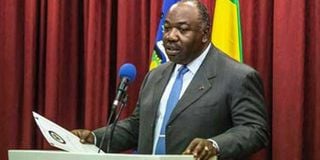Ali Bongo sworn in as Gabon president after disputed win

Gabon's President Ali Bongo at a past event. He was sworn back in as Gabon's president on September 27, 2016. AFP PHOTO
What you need to know:
- Cannons were fired during the ceremony in the seafront presidential palace in Libreville, as fears of fresh violence resurfaced.
- Ali Bongo took over from his father Omar Bongo, who ruled for 41 years until his death in 2009.
LIBREVILLE
Ali Bongo was sworn back in as Gabon's president Tuesday, calling for unity after a disputed election win that sparked deadly unrest and revealed deep divisions in the oil-rich country.
The 57-year-old used the ceremony to appeal for unity after the deadly violence that followed the announcement of his victory last month.
He pledged to ensure "equal opportunities" for all in the new government "which I will name in a few days."
Government spokesman Alain-Claude Bilie-By-Nze said Bongo wanted to install "a unity government by this week or the start of next week".
Cannons were fired during the ceremony in the seafront presidential palace in Libreville, as fears of fresh violence resurfaced.
"I pledge to devote all my efforts for the good of the Gabonese people and to ensure their well-being... and respect and defend the constitution and the rule of law," he said during the event.
"Our country is going through a worrying period in its history," he added.
A handful of African leaders attended including the presidents of Mali, Niger, Togo and Sao Tome, as well as the prime ministers of Chad, Senegal, the Central African Republic and Morocco. But most regional heavyweights stayed away.
Bongo's second mandate has received a cool reception from the African Union and the United Nations, while the European Union voiced regret that the count had not been transparent.
But Bongo on Tuesday said the "democratic process has been recognised by everybody, including foreign observers".
FRAUD
"I want to reassure our international partners, especially our traditional ones, that we will spare no effort to maintain good relations and friendship between our people," he said.
Bongo's wafer-thin victory in the August 27 vote was confirmed on Saturday by the Constitutional Court, which dismissed opposition claims of vote fraud.
Defeated opposition contender Jean Ping, 73, lashed the court's ruling as a miscarriage of justice and declared himself "president elect".
He has so far not responded to Bongo's overtures for a dialogue.
A career diplomat and a former top official at the African Union, Ping had filed a legal challenge after Bongo was declared the winner by a mere 6,000 votes.
Violence initially erupted on August 31 after Bongo was first declared the winner. Demonstrators set parliament ablaze and clashed with police, who made a thousand arrests.
Opposition figures say more than 50 people were killed. The government has given a toll of three dead.
Ping had asked for a recount in Haut-Ogooue province, where 95 percent of voters in the Bongo family stronghold were reported to have cast their ballots for the president on a turnout of more than 99 percent.
In its final tally, the court ruled Bongo had won 50.66 percent of the vote and Ping 47.24 percent, extending Bongo's lead to 11,000 votes over his opponent.
The European Union's electoral observer mission said Sunday it "regretted" that the court "had been unable to satisfactorily rectify anomalies observed during the count".
Former colonial power France said that the verdict clearing Bongo's victory "has not lifted all the doubts" about the process.
Bongo's family has exercised a long grip on power in the oil- and mineral-rich country of 1.8 million people.
Ali Bongo took over from his father Omar Bongo, who ruled for 41 years until his death in 2009.
Cameroon's President Paul Biya, who is 83 and has held office since 1982, wrote to Bongo Monday voicing his "warm congratulations", wishing him "success in the accomplishment of (his) new mandate".
Senegal's President Macky Sall also congratulated Bongo, as did Ivory Coast head of state Alassane Ouattara.
"In the delicate period which Gabon is going through, I want to express to you my full encouragement and hope passionately that dialogue and calm will predominate," Ouattara wrote in a statement.
Gabon has large oil, mineral and tropical timber resources, and its per-capita national income is four times greater than that of most sub-Saharan nations.





